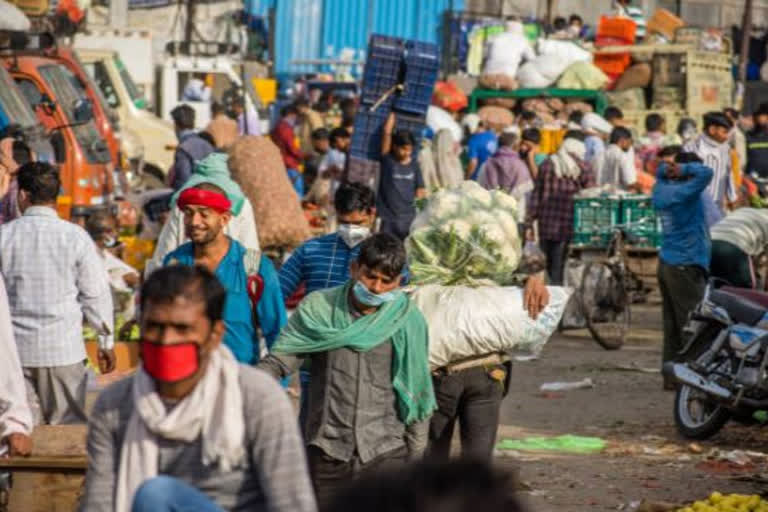New Delhi: The COVID-19 crisis has the potential to push around 40 crore informal sector workers in India deeper into poverty, with the lockdown and other containment measures affecting jobs and earnings, an International Labour Organisation (ILO) report said on Tuesday.
India has imposed a three-week lockdown till April 14 to contain the pandemic. As per ILO, India is among the countries less equipped to handle the situation.
"COVID-19 is already affecting tens of millions of informal workers. In India, Nigeria and Brazil, the number of workers in the informal economy affected by the lockdown and other containment measures is substantial," the ILO report released in Geneva said.
"In India, with a share of almost 90 per cent of people working in the informal economy, about 400 million workers in the informal economy are at risk of falling deeper into poverty during the crisis."
"Current lockdown measures in India, which are at the high end of the University of Oxford''s COVID-19 Government Response Stringency Index, have impacted these workers significantly, forcing many of them to return to rural areas," it said.
The report further said countries experiencing fragility, protracted conflict, recurrent natural disasters or forced displacement will face a multiple burden due to the pandemic.
Read more:Lockdown: Retailers expect around 80,000 job losses, says survey
"They are less equipped to prepare for and respond to COVID-19 as access to basic services, especially health and sanitation, is limited; decent work, social protection and safety at work are not a given; their institutions are weak; and social dialogue is impaired or absent," it added.
The ILO also noted that the pandemic is having a catastrophic effect on working hours and earnings globally.
The new ILO report highlights some of the worst affected sectors and regions, and outlines policies to mitigate the crisis.
It found that the crisis is expected to wipe out 6.7 per cent of working hours globally in the second quarter of 2020 -- equivalent to 195 million full-time workers.
Large reductions are foreseen in the Arab states, (8.1 per cent, equivalent to 5 million full-time workers), Europe, (7.8 per cent, or 12 million full-time workers) and Asia and the Pacific (7.2 per cent, 125 million full-time workers).
Workers at risk, informality, and social protection Huge losses are expected across different income groups but especially in upper-middle income countries (7 per cent, 100 million full-time workers). This far exceeds the effects of the 2008-9 financial crisis.
The sectors most at risk include accommodation and food services, manufacturing, retail, and business and administrative activities.
Workers at risk: Sectoral perspective Workers at risk: Sectoral perspective The eventual increase in global unemployment during 2020 will depend substantially on future developments and policy measures.
There is a high risk that the end-of-year figure will be significantly higher than the initial ILO projection of 25 million, it said.
More than four out of five people (81 per cent) in the global workforce of 3.3 billion are currently affected by full or partial workplace closures.
"Workers and businesses are facing catastrophe, in both developed and developing economies," ILO Director-General Guy Ryder said. "We have to move fast, decisively, and together. The right, urgent, measures, could make the difference between survival and collapse."
Workers facing worst crisis since WWII amid pandemic
The ''ILO Monitor 2nd edition: COVID-19 and the world of work'', which describes COVID-19 as "the worst global crisis since World War II", updates an ILO research note published on March 18.
The updated version includes sectoral and regional information on the effects of the pandemic.
According to the new study, 1.25 billion workers are employed in the sectors identified as being at high risk of "drastic and devastating" increases in layoffs and reductions in wages and working hours. Many are in low-paid, low-skilled jobs, where a sudden loss of income is devastating.Some 1.25 billion workers are seeing their livelihoods threatened by the COVID-19 pandemic, the United Nations said, warning it was the "worst global crisis" since World War II.
Informal workers under lockdown and other containment measures Looked at regionally, the proportion of workers in these "at risk" sectors varies from 41 per cent in the Americas to 26 per cent in Asia and the Pacific.
Other regions, particularly Africa, have higher levels of informality, which combined with a lack of social protection, high population density and weak capacity, pose severe health and economic challenges for governments, the report cautions.
Worldwide, two billion people work in the informal sector (mostly in emerging and developing economies) and are particularly at risk.
Large-scale, integrated, policy measures are needed, focusing on four pillars -- supporting enterprises, employment and incomes; stimulating the economy and jobs; protecting workers in the workplace; and, using social dialogue between government, workers and employers to find solutions, the study says.
"This is the greatest test for international cooperation in more than 75 years," said Ryder.
"If one country fails, then we all fail. We must find solutions that help all segments of our global society, particularly those that are most vulnerable or least able to help themselves.
"The choices we make today will directly affect the way this crisis unfolds and so the lives of billions of people," he added.
(PTI Report)
